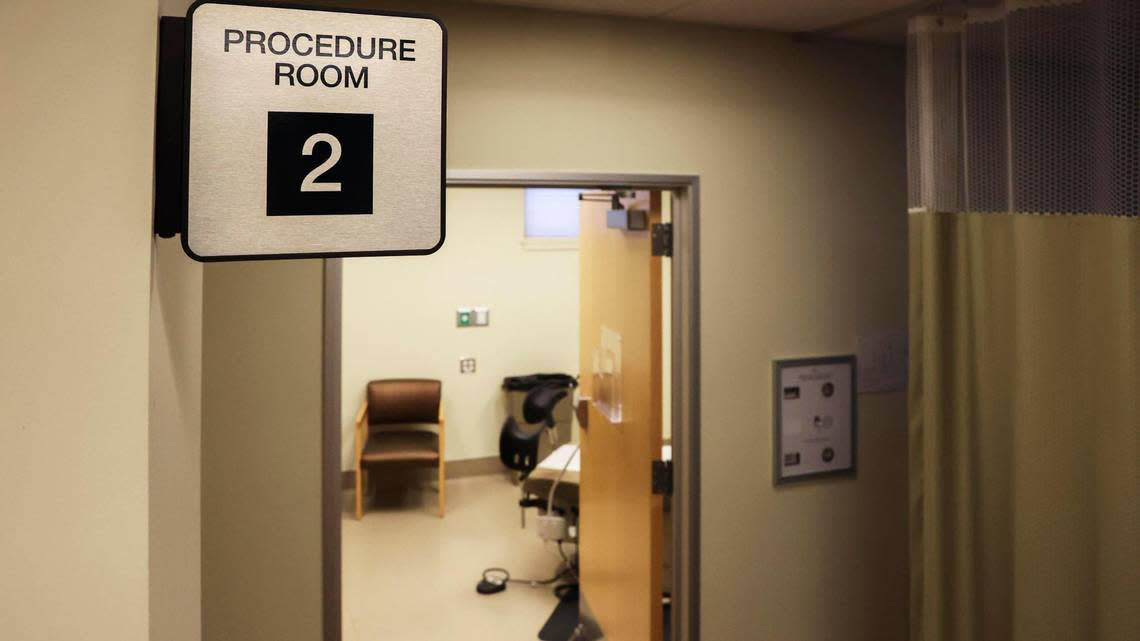Can Idaho doctors refer patients to abortions out of state? Here’s what a court ruled

- Oops!Something went wrong.Please try again later.
Idaho Attorney General Raúl Labrador can’t seek criminal penalties against medical providers who refer patients out of state for legal abortions, a federal judge ruled Monday.
Labrador on March 27 issued an opinion that said Idaho doctors violate the state’s abortion ban when they refer patients to a state where abortion is legal. Labrador later rescinded the opinion, saying it was improperly requested, but he has not disavowed it.
Attorneys representing two Idaho family doctors, Planned Parenthood and St. Luke’s Health System asked the U.S. District Court for Idaho to declare the legal interpretation an unconstitutional “chilling” of free speech.
The medical providers’ lawsuit sought to block the attorney general’s office and Idaho’s 44 county prosecutors from enforcing Labrador’s interpretation of the law. The providers also asked that members of the Idaho State Board of Medicine and Board of Nursing be blocked from taking licensing actions against doctors based on the interpretation.
In a Monday decision, U.S. District Court Judge B. Lynn Winmill wrote that the medical providers “established that there is a genuine threat of prosecution,” and the “threat has resulted in the chilling” of their speech.
“We are relieved that the court saw the clear threat to Idahoans’ health and autonomy and blocked enforcement of this egregious legal opinion,” Alexis McGill Johnson, president and CEO of Planned Parenthood Federation of America, said in a news release. “Providers are already banned from providing abortion care in Idaho. To prevent them from serving as trusted resources for patients — further harming people in need of care — is a reckless encroachment on their rights.”
Winmill, however, denied the providers’ request regarding the licensing boards. The providers “failed to explain what authority either board has to prosecute or enforce violations of Idaho’s criminal abortion statute,” Winmill wrote.
The longtime federal judge also deferred a ruling on the county prosecutors to a later date. All but three of the state’s county prosecutors joined the attorney general’s office in defending the case.
Beth Cahill, Labrador’s spokesperson, said that attorney general officials “strongly disagree” with the order. Labrador has already appealed the decision.
“In his 28-year career you’d be hard pressed to find a time when Judge Winmill has ruled against Planned Parenthood, so his decision is not surprising,” Cahill said by email. “Judge Winmill wants to restrain a power we don’t possess.”
Physicians’ speech ‘chilled’ after AG opinion
Pregnancy doctors stopped having “comprehensive conversations” with patients about out-of-state abortion options after learning of Labrador’s “overbroad and unsupported interpretation” of the state’s abortion ban, the lawsuit said.
“It’s very understandable that they remain chilled when the attorney general isn’t willing to say that the analysis is wrong,” Peter Neiman, a New York attorney representing Planned Parenthood, said during an April 24 hearing.
Idaho’s law requires that a health care professional who “assists in performing or attempting to perform an abortion” has their license suspended. That applies to referring a patient across state lines for an abortion, Labrador wrote in the March legal opinion addressed to Republican state Rep. Brent Crane, R-Nampa.
Labrador’s decision to withdraw the letter likely means it no longer carries legal weight, Winmill said during the April hearing. But the fact that the state’s top attorney issued the opinion means physicians “face a substantial threat of future enforcement under the statute.”
“It does not change the fact that it was a public statement made by Idaho’s chief legal officer,” Winmill said. “Their opinion carries weight.”
Labrador’s attorney says physicians’ claims are moot
Lincoln Davis Wilson, chief of Labrador’s Civil and Constitutional Defense Division, said during the April hearing that the physicians’ chilling effect argument is moot because Labrador withdrew the opinion, which was not meant to be released publicly.
“He wrote a letter to Rep. Crane that was then put out on the internet and a bunch of other people saw it,” Wilson said during the hearing. The physicians “know the fact that he previously expressed the opinion, but that doesn’t mean that there’s a threat to them.”
Stanton International, an anti-abortion group based in Meridian, published the letter online “and used it in fundraising efforts,” according to Winmill’s decision. Labrador withdrew the opinion on April 7.
During the April hearing, Winmill asked Wilson to confirm that Labrador has not disavowed the March opinion.
“That is correct, but it’s not the right framing of the issue,” Wilson responded. “That’s because if there is no properly presented context for us to have an opinion on this issue, then we don’t have an opinion on this issue. Nothing has called on us to do so.”
In his Monday opinion, Winmill wrote that the attorney general’s office could have shown “that no case or controversy exists” if Labrador had denounced the Crane letter or stated that he would not enforce its legal interpretation.
“Instead, the attorney general has strained at every juncture possible to distance himself from his previous statement without committing to a new interpretation or providing any assurances to this court or the medical providers,” Winmill wrote. “Attorney General Labrador’s targeted silence is deafening.”
The physician plaintiffs in the case are Dr. Darin L. Weyhrich, a Boise gynecologist, and Dr. Caitlin Gustafson, a family doctor from Valley County, who was the plaintiff in Planned Parenthood’s unsuccessful challenge to the state’s abortion ban last year.
The American Civil Liberties Union of Idaho also provided legal aid to the physicians.

